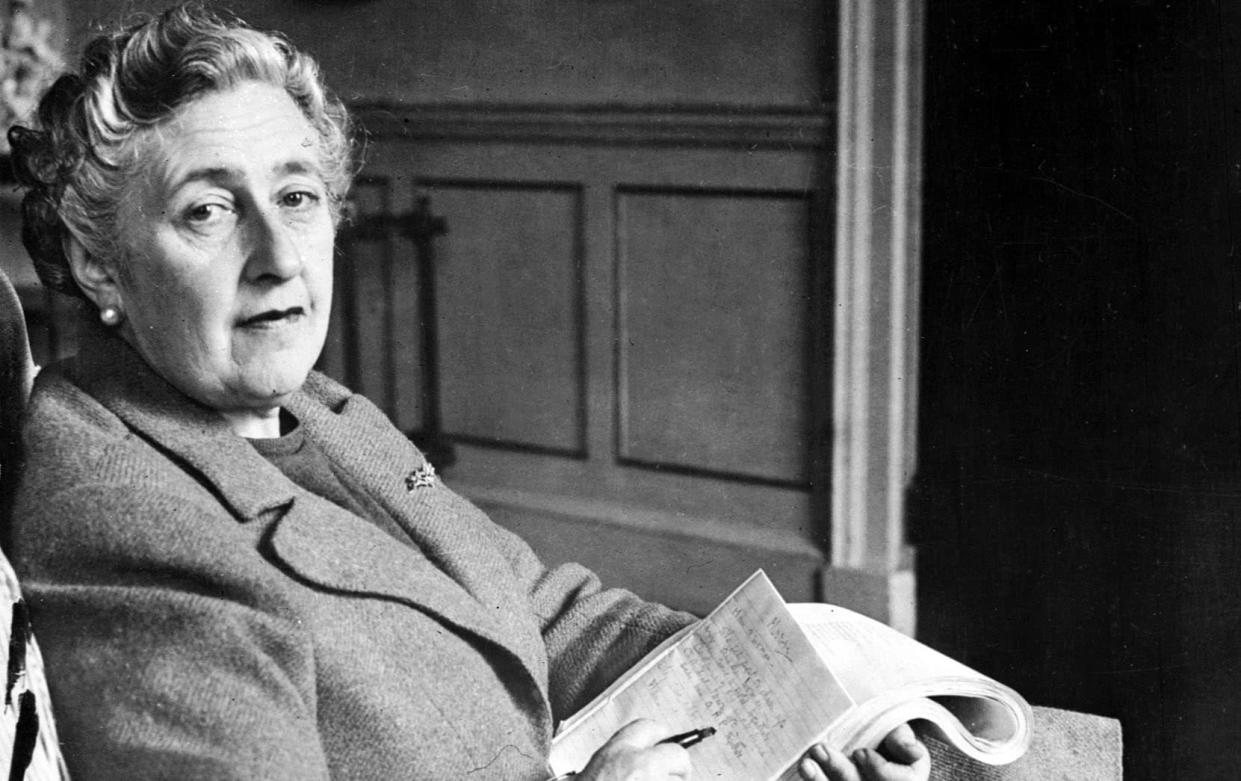This woke censorship of Agatha Christie is wrong – and here’s why

- Oops!Something went wrong.Please try again later.
Agatha Christie has become the latest author to fall victim to posthumous censorship. New digital editions of her novels, we learned at the weekend, have been edited to reflect “modern sensitivities”. In other words: just about anything that might conceivably offend a progressive 21st-century reader has been rewritten or removed. Especially if it relates to race.
I find this sort of behaviour from publishers odd. Because it suggests that, despite dedicating their lives to novels, they don’t actually know what a novel is.
As much as anything else, a novel is a kind of time capsule: a record of the period in which it was written. It reflects the period’s culture, its language, its beliefs, its attitudes – and yes, its prejudices. Older novels, therefore, have a special historical value: they teach us about the past. Indeed, they bring it to life – and far more vividly than a history book.
To literary snobs, the whodunits of Agatha Christie may seem like two-dimensional, throwaway entertainments. But they have as much historical value as the work of any Nobel-winner. And that’s why the parts that 21st-century readers find offensive shouldn’t be rewritten or removed. On the contrary, it’s vital they remain.
Christie’s novels, especially the earlier ones, often feature dialogue that is racist. In particular, stereotypes of Jewish people are commonplace. For example, in Peril at End House (published 1932), one character describes another as “Rolling in money, of course. Did you see that car of his? He’s a Jew, of course, but a frightfully decent one.”
Similarly, in The Murder of Roger Ackroyd (1926), a character complains of being hounded for money by a couple of Scottish creditors. “They are usually Scotch gentlemen,” replies another character, “but I suspect a semitic strain in their ancestry.”
Note how casually the characters make such remarks. Note also how no other character objects. This teaches the 21st-century reader something important about the period in which these books were written. In the 1920 and 30s, middle-class, educated, well-mannered English people could, and would, give voice to nakedly antisemitic prejudice in everyday conversation – without fear of rebuke or disagreement. It was perfectly unremarkable, at the time. Antisemitism, after all, was not invented by the Nazis. It is an ancient and widespread prejudice. Reading an early Agatha Christie highlights this – and if it shocks the 21st-century reader, then good. It should.
Obviously antisemitism still exists in Britain today. But it tends to be subtler and less overt than it was in Christie’s time. And often it comes from people who profess to be staunch anti-racists – as demonstrated by the EHRC investigation into antisemitism in the Labour party.
Christie’s books contained other forms of casual racism, too. For example, in Cards on the Table, a Poirot mystery from 1936, a character boasts: “I never forget a face – even a black one – and that’s a lot more than most people can say.”
Admittedly this isn’t the first time that Christie’s work has been edited to avoid causing offence. In 1939 she wrote a bestselling mystery with a quite spectacularly racist title. The publishers eventually changed it (to And Then There Were None), and they were right to do so. A title, after all, appears on a book’s cover and spine, and will therefore be seen by innocent browsers, including children – not just people who have actively chosen to buy or borrow the book. It’s the same with swearing. A novel may legitimately contain foul language. But it should not appear on the cover.
In this case, though, it’s the contents of Christie’s novels that are being edited. And to remove the racially insensitive language, and other unpleasant or outdated elements, strips them of their historical value. Not only that, it gives the modern reader a misleading impression of the past. It makes it seem as if the people of 100 years ago held the exact same views and values that we hold today. Which is, of course, utterly false.
After being subjected to this type of PC sanitising, therefore, an old novel is no longer just fiction. It’s a lie.
The image that restored my faith in France
The violence in France may seem disturbing. One glorious piece of footage from the weekend, however, suggests that the country is not altogether lost.
It shows French diners sitting outside a cafe in Bordeaux after dark, calmly enjoying a bottle of wine – while completely ignoring the fact that rioters have set the street on fire.
They simply don’t care. They are entirely unperturbed. The fire doesn’t remotely interest them. Nothing, not even a violent nationwide protest against their president, is going to stop them from appreciating fine wine.
Magnificent. The true spirit of France. The French tourism industry should use the footage in their next advertising campaign.
“France. Where it is always warm enough to drink outdoors at night. Because all the neighbouring buildings are on fire.”
I love it. That video clip has restored my faith in the French people. Next, I want to see footage of a bored-looking middle-aged Frenchman in a black turtleneck, strolling up to a burning patisserie, and using it to light his Gitanes.

